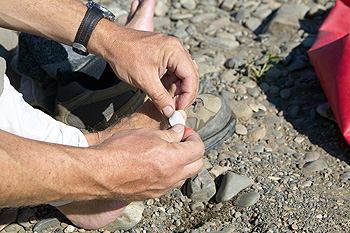
Foot blisters are a common and painful skin condition that can disrupt your daily life. These small, fluid filled sacs form as a result of friction or pressure on the skin, typically caused by ill fitting shoes, prolonged periods of walking or running, or repetitive movements. Blisters can develop on any part of the foot, but they are most commonly found on the heels, toes, and soles. The body creates blisters as a protective mechanism and the clear fluid inside serves as a cushion to shield the underlying skin from further damage. While blisters will often heal on their own, it is important to avoid popping them as this can increase the risk of infection. Instead, keep the area clean, apply a sterile dressing, and protect it from further irritation. Wearing shoes that fit properly is a preventive measure, in addition to using friction reducing creams to minimize the likelihood of foot blisters. If you have developed blisters on your feet, it is suggested that you confer with a podiatrist who can offer you additional prevention methods.
Blisters are prone to making everyday activities extremely uncomfortable. If your feet are hurting, contact one of our podiatrists of Lovely Foot Associates, PC. Our doctors can provide the care you need to keep you pain-free and on your feet.
Foot Blisters
Foot blisters develop as a result of constantly wearing tight or ill-fitting footwear. This happens due to the constant rubbing from the shoe, which can often lead to pain.
What Are Foot Blisters?
A foot blister is a small fluid-filled pocket that forms on the upper-most layer of the skin. Blisters are filled with clear fluid and can lead to blood drainage or pus if the area becomes infected.
How Do Blisters Form?
Blisters on the feet are often the result of constant friction of skin and material, usually by shoe rubbing. Walking in sandals, boots, or shoes that don’t fit properly for long periods of time can result in a blister. Having consistent foot moisture and humidity can easily lead to blister formation.
Prevention & Treatment
It is important to properly care for the affected area in order to prevent infection and ease the pain. Do not lance the blister and use a Band-Aid to provide pain relief. Also, be sure to keep your feet dry and wear proper fitting shoes. If you see blood or pus in a blister, seek assistance from a podiatrist.
If you have any questions, please feel free to contact our office located in Johnstown, PA . We offer the newest diagnostic and treatment technologies for all your foot care needs.
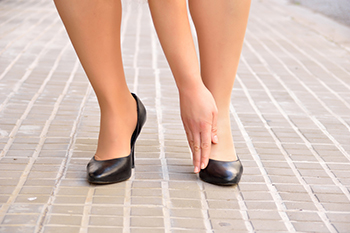
When it comes to high heels, opinions vary widely. Some find them elegant and empowering, while others associate them with discomfort. If you belong to the latter group, it might be because you have not discovered the right heel height for your feet. Comfort varies from person to person, depending on foot shape, shoe type, and experience with heels. The average heel height is around 3 inches, falling into the mid-height range. Low heels are 1 to 2 inches, while high heels are 3 to 4 inches. Finding your ideal heel height may require some experimentation. It's a good idea to prioritize foot health and alternate between heels and flats. To measure heel height, place the shoe on a flat surface and measure from the bottom of the heel to where it connects to the shoe. If you would like to wear heels, it is suggested that you make an appointment with a podiatrist to get advice on wearing this type of shoe for your particular feet and prioritizing style and comfort.
High heels have a history of causing foot and ankle problems. If you have any concerns about your feet or ankles, contact one of our podiatrists from Lovely Foot Associates, PC. Our doctors can provide the care you need to keep you pain-free and on your feet.
Effects of High Heels on the Feet
High heels are popular shoes among women because of their many styles and societal appeal. Despite this, high heels can still cause many health problems if worn too frequently.
Which Parts of My Body Will Be Affected by High Heels?
What Kinds of Foot Problems Can Develop from Wearing High Heels?
How Can I Still Wear High Heels and Maintain Foot Health?
If you want to wear high heeled shoes, make sure that you are not wearing them every day, as this will help prevent long term physical problems. Try wearing thicker heels as opposed to stilettos to distribute weight more evenly across the feet. Always make sure you are wearing the proper shoes for the right occasion, such as sneakers for exercising. If you walk to work, try carrying your heels with you and changing into them once you arrive at work. Adding inserts to your heels can help cushion your feet and absorb shock. Full foot inserts or metatarsal pads are available.
If you have any questions please feel free to contact our office located in Johnstown, PA . We offer the newest diagnostic and treatment technologies for all your foot and ankle needs.
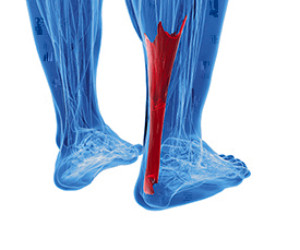
The Achilles tendon connects the calf muscles to the heel bone and plays a vital role in everyday movements. It allows you to perform actions like rising up on the toes, walking, and running. Despite its strength, the Achilles tendon is susceptible to various injuries that can be painful and debilitating. Achilles tendinopathy, also known as Achilles tendonitis, involves tiny tears in the tissue surrounding the tendon. These are often caused by overuse. Symptoms include pain, swelling, tenderness, morning stiffness, and decreased strength and movement in the affected leg. An Achilles tendon tear or rupture is a more severe injury that can result in sudden, sharp pain, swelling, bruising, and a loss of function, making it difficult to point the foot downward or stand on the toes. Some patients with partial tears may not experience noticeable symptoms. It's important to note that Achilles tendon issues often develop gradually due to cumulative damage. If you suspect you have incurred an Achilles tendon injury, it is suggested that you make an appointment with a podiatrist for the most suitable treatment approach for dealing with your injury.
Achilles tendon injuries need immediate attention to avoid future complications. If you have any concerns, contact one of our podiatrists of Lovely Foot Associates, PC. Our doctors can provide the care you need to keep you pain-free and on your feet.
What Is the Achilles Tendon?
The Achilles tendon is a tendon that connects the lower leg muscles and calf to the heel of the foot. It is the strongest tendon in the human body and is essential for making movement possible. Because this tendon is such an integral part of the body, any injuries to it can create immense difficulties and should immediately be presented to a doctor.
What Are the Symptoms of an Achilles Tendon Injury?
There are various types of injuries that can affect the Achilles tendon. The two most common injuries are Achilles tendinitis and ruptures of the tendon.
Achilles Tendinitis Symptoms
Rupture Symptoms
Treatment and Prevention
Achilles tendon injuries are diagnosed by a thorough physical evaluation, which can include an MRI. Treatment involves rest, physical therapy, and in some cases, surgery. However, various preventative measures can be taken to avoid these injuries, such as:
If you have any questions please feel free to contact our office located in Johnstown, PA . We offer the newest diagnostic tools and technology to treat your foot and ankle needs.
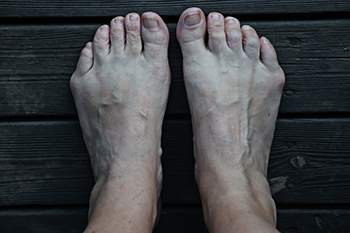
A tailor's bunion, also known as a bunionette, is a condition characterized by the formation of a bony lump on the outer side of the little toe. This condition occurs when the fifth metatarsal bone, which is the bottom bone of the little toe, enlarges or shifts outward. Although less common than big toe bunions, a tailor's bunion can still cause discomfort and pain. Symptoms of a tailor's bunion include a swollen bump on the outer side of the toe, which can become red and painful, especially when it rubs against footwear. Tailor's bunions can affect one or both feet. Factors that contribute to the development of tailor's bunions include wearing ill-fitting shoes, being genetically predisposed to structural foot abnormalities, and having loose foot ligaments. A lower-than-normal fifth metatarsal bone or tight calf muscles can also contribute to the condition. In severe cases, surgery may be recommended. For help with a bunionette, it is suggested that you make an appointment with a podiatrist.
If you are suffering from bunion pain, contact one of our podiatrists of Lovely Foot Associates, PC. Our doctors can provide the care you need to keep you pain-free and on your feet.
What Is a Bunion?
Bunions are painful bony bumps that usually develop on the inside of the foot at the joint of the big toe. As the deformity increases over time, it may become painful to walk and wear shoes. Women are more likely to exacerbate existing bunions since they often wear tight, narrow shoes that shift their toes together. Bunion pain can be relieved by wearing wider shoes with enough room for the toes.
Causes
Symptoms
In order to diagnose your bunion, your podiatrist may ask about your medical history, symptoms, and general health. Your doctor might also order an x-ray to take a closer look at your feet. Nonsurgical treatment options include orthotics, padding, icing, changes in footwear, and medication. If nonsurgical treatments don’t alleviate your bunion pain, surgery may be necessary.
If you have any questions, please feel free to contact our office located in Johnstown, PA . We offer the newest diagnostic and treatment technologies for all your foot care needs.
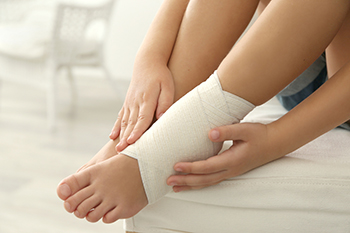
An ankle sprain can result in persistent pain and swelling despite rest and physical therapy. The location of the pain can indicate different issues. Frontal pain may suggest damage within the ankle joint or at the front of the ankle. Patients with joint surface injuries or front ankle problems typically experience discomfort during walking, running, or jumping activities, with increased pain on stairs or uneven surfaces. Lateral or side ankle pain may arise from synovitis, which is inflammation of the joint lining, due to a recent sprain, tendon tears, dislocation, or hidden fractures. Synovitis causes front ankle pain, worsening with activities like stair climbing and running, accompanied by swelling and reduced joint motion. Peroneal tendon tears usually manifest as delayed lateral ankle pain and swelling, aggravated by physical activity, especially on uneven terrain. Fractures can mimic sprains but require different treatments. Treatment for ankle sprains may include immobilization, medication, or surgery. If you have sprained your ankle, it is strongly suggested that you make an appointment with a podiatrist for a diagnosis and an individualized treatment plan.
Ankle pain can be caused by a number of problems and may be potentially serious. If you have ankle pain, consult with one of our podiatrists from Lovely Foot Associates, PC. Our doctors will assess your condition and provide you with quality foot and ankle treatment.
Ankle pain is any condition that causes pain in the ankle. Due to the fact that the ankle consists of tendons, muscles, bones, and ligaments, ankle pain can come from a number of different conditions.
Causes
The most common causes of ankle pain include:
Symptoms
Symptoms of ankle injury vary based upon the condition. Pain may include general pain and discomfort, swelling, aching, redness, bruising, burning or stabbing sensations, and/or loss of sensation.
Diagnosis
Due to the wide variety of potential causes of ankle pain, podiatrists will utilize a number of different methods to properly diagnose ankle pain. This can include asking for personal and family medical histories and of any recent injuries. Further diagnosis may include sensation tests, a physical examination, and potentially x-rays or other imaging tests.
Treatment
Just as the range of causes varies widely, so do treatments. Some more common treatments are rest, ice packs, keeping pressure off the foot, orthotics and braces, medication for inflammation and pain, and surgery.
If you have any questions, please feel free to contact our office located in Johnstown, PA . We offer the newest diagnostic and treatment technologies for all your foot care needs.

Cycling offers numerous health benefits, including cardiovascular improvement, enhanced joint mobility, and strengthened leg muscles. However, cycling without the proper footwear also can strain your lower limbs. While regular running shoes are suitable for occasional cyclists, dedicated cyclists who spend hours daily on the road or in the gym require specialized cycling shoes. Orthotics can play a pivotal role in boosting cycling performance as they can help to increase pedal efficiency, enhance power output, and improve foot stability. They also can help to reduce foot fatigue, improve arch support, provide better metatarsal padding, and offer relief from plantar fascial tension. Custom-made shoe insoles are an important consideration for cycling enthusiasts with flat feet, supination, pronation issues, or specific conditions like plantar fasciitis. A podiatrist can make a set of orthotics designed to fit your unique foot structure, using custom molds that mirror the exact shape of the foot. For help with custom shoe inserts made specifically for cycling shoes, it is suggested that you make an appointment with a podiatrist.
If you are having discomfort in your feet and would like to try orthotics, contact one of our podiatrists from Lovely Foot Associates, PC. Our doctors can provide the care you need to keep you pain-free and on your feet.
What Are Orthotics?
Orthotics are inserts you can place into your shoes to help with a variety of foot problems such as flat feet or foot pain. Orthotics provide relief and comfort for minor foot and heel pain but can’t correct serious biomechanical problems in your feet.
Over-the-Counter Inserts
Orthotics come in a wide variety of over-the-counter inserts that are used to treat foot pain, heel pain, and minor problems. For example, arch supports can be inserted into your shoes to help correct overarched or flat feet, while gel insoles are often used because they provide comfort and relief from foot and heel pain by alleviating pressure.
Prescription Orthotics
If over-the-counter inserts don’t work for you or if you have a more severe foot concern, it is possible to have your podiatrist prescribe custom orthotics. These high-quality inserts are designed to treat problems such as abnormal motion, plantar fasciitis, and severe forms of heel pain. They can even be used to help patients suffering from diabetes by treating foot ulcers and painful calluses and are usually molded to your feet individually, which allows them to provide full support and comfort.
If you are experiencing minor to severe foot or heel pain, it’s recommended to speak with your podiatrist about the possibilities of using orthotics. A podiatrist can determine which type of orthotic is right for you and allow you to take the first steps towards being pain-free.
If you have any questions please contact our office located in Johnstown, PA . We offer the newest diagnostic and treatment technologies for all your foot and ankle needs.
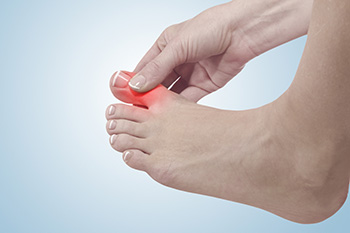
Toe pain can disrupt your daily routine and affect mobility. Common causes for toe pain consist of ingrown toenails, bunions, and gout. An ingrown toenail can develop from wearing shoes that are too tight, or it may happen from trimming the toenails incorrectly. A bunion is described as a bony lump that forms on the side of the big toe and can cause a moderate level of discomfort. Gout is considered to be a form of arthritis that often affects the joints in the big toe, possibly causing debilitating pain. It is crucial to uncover the cause of the toe pain, and this can precede the correct treatment. Resting the affected foot can help reduce existing swelling caused by toe pain. Some toe pain may be alleviated by wearing shoes that fit correctly and performing specific types of stretches that can improve flexibility and reduce pain. In severe cases, surgical intervention may be necessary to correct structural issues. It is suggested that you consult a podiatrist who can determine the underlying cause of your toe pain and provide personalized treatment for recovery.
Toe pain can disrupt your daily activities. If you have any concerns, contact one of our podiatrists of Lovely Foot Associates, PC. Our doctors can provide the care you need to keep you pain-free and on your feet.
What Causes Toe Pain?
Most severe toe pain is caused due to a sports injury, trauma from dropping something heavy on the toe, or bumping into something rigid. Other problems can develop over time for various reasons.
Toe pain can be caused by one or more ailments. The most common include:
When to See a Podiatrist
Diagnosis
In many cases the cause of toe pain is obvious, but in others, a podiatrist may want to use more advanced methods to determine the problem. These can range from simple visual inspections and sensation tests to X-rays and MRI scans. Prior medical history, family medical history, and any recent physical traumatic events will all be taken into consideration for a proper diagnosis.
Treatment
Treatments for toe pain and injuries vary and may include shoe inserts, padding, taping, medicines, injections, and in some cases, surgery. If you believe that you have broken a toe, please see a podiatrist as soon as possible.
If you have any questions please feel free to contact our office located in Johnstown, PA . We offer the newest diagnostic tools and technology to treat your foot and ankle needs.

Most experts recommend letting babies go barefoot until they are getting ready to walk. However, finding the right shoes for their first steps can be confusing. The first concern is choosing the right size shoes for your toddler’s feet, and with an increase in age, the shoe size may change frequently. One way to determine the correct size is by inserting the pinky finger between the heel of the shoe and the child’s ankle. It should be snug. Then press the tip of the shoe while the baby is standing. There should be about half an inch of space. Next, choose shoes that are made of lightweight materials and are flexible. Shoes that are easy to put on and take off are desired, along with washability. It is thought that toddlers will need a new pair of shoes every two to three months. Hand-me-down shoes are discouraged as each child has a different foot structure. For additional guidance on choosing walking shoes for your child, it is suggested that you make an appointment with a podiatrist.
The health of a child’s feet is vital to their overall well-being. If you have any questions regarding foot health, contact one of our podiatrists of Lovely Foot Associates, PC. Our doctors can provide the care you need to keep you pain-free and on your feet.
Tips for Keeping Children's Feet Healthy
If you have any questions, please feel free to contact our office located in Johnstown, PA . We offer the newest diagnostic and treatment technologies for all your foot care needs.